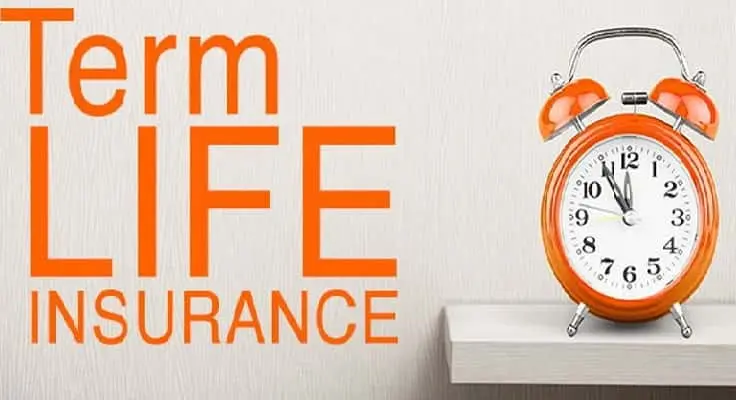A kind of death benefit known as term life insurance, often called pure life insurance, pays the policyholder’s heirs over a predetermined period. If the insured individual passes away within a predetermined term, term life insurance ensures payment of a defined death benefit toward the insured’s beneficiaries. These policies lack the savings element included in whole life insurance products and have no worth beyond the guaranteed death payout. Age, health, & life expectancy are all factors that affect the cost of term life insurance.
When you purchase term life insurance, the insurance provider establishes the premium based on your gender, age, and health as well as the value of the policy (the payment amount).
Occasionally, a medical examination could be necessary. Your driving history, smoking status, occupation, current medications, interests, and family history may all be questioned by the insurance provider.

The insurer gets to pay your beneficiaries the face value of the insurance if you pass away within the policy period. Beneficiaries may use this cash benefit to pay for your funeral and medical expenses, mortgage debt, and consumer debt, among many other things. It is generally not taxed.
The policyholder has three options after the term has ended: they can choose to convert their term life insurance to permanent insurance, revive it for a new term, or let it lapse.
Types of Term Insurance in India
| Type of Term Life Insurance |
Description |
| Level Term Insurance |
Provides a fixed sum assured (death benefit) throughout the policy term. Premiums remain the same over the entire duration. Suitable for those seeking consistent coverage and budgeting. |
| Decreasing Term Insurance |
The sum assured decreases over the policy term, usually designed to align with a decreasing liability, such as a home loan. Premiums are typically lower than level term insurance. Suitable for individuals with specific financial obligations that decrease over time. |
| Increasing Term Insurance |
The sum assured increases over time to account for inflation and changing financial needs. Premiums also increase accordingly. Offers protection against rising living costs and maintaining the value of the coverage. Suitable for individuals looking for long-term financial security. |
| Convertible Term Insurance |
Provides the option to convert the term policy into a permanent life insurance policy (such as whole life or endowment) without the need for additional medical underwriting. Offers flexibility for future insurance needs. |
| Return of Premium (ROP) Term Insurance |
Returns the total amount of premiums paid during the policy term if the insured survives until the end of the policy. Premiums are usually higher compared to traditional term insurance. Offers a refund of premiums if the insured outlives the policy term. Suitable for those who prefer a savings component in their life insurance. |
| Term Insurance with Riders |
Additional optional riders can be attached to the base term insurance policy for enhanced coverage. Examples include critical illness rider, accidental death rider, waiver of premium rider, etc. Riders provide extra protection tailored to specific needs. |
👍 Term Life Insurance Advantages
The term insurance plan provides the insured with security and life coverage. In addition to these major benefits, term insurance plans also have the following major benefits:
1. Easy to grasp: When contrasted to other life insurance products like endowment plans, money-back plans, etc., a term insurance plan is one of the simplest. The other types of life insurance are a combination of savings and savings. In contrast, you must pay the premium amount and acquire life coverage for the selected policy period with such a term insurance plan.
2. Flexibility: The renewable and convertible features of term insurance policies give them a higher amount of flexibility. Without having a medical checkup, the insured may renew their term insurance policy. The insured also has the option to convert the term plan into such an endowment plan with the existing sum assured and the higher premium amount. With a term plan, you can easily terminate the policy since as when you stop paying your premium, the insurance will end. The insured really shouldn’t worry about the payout, unlike endowment schemes. Term insurance policies provide a death payment but no savings element.
3. Cost-effective: Among the most popular and economical life insurance options is the term plan. Because term insurance premiums are affordable and the insured can obtain substantial life coverage, it is a popular choice. The cost of term insurance premiums is 6 times less than the cost of the other types of life insurance.
4. Tax Advantage: The insured may receive a tax advantage from the term insurance plan that various life insurance firms provide. Term insurance has a lower premium and qualifies for a tax break under Section 80C.
👎 Term Life Insurance Disadvantages
The cost of term insurance attracts attention when considering purchasing a term plan.
Everything, however, has benefits and drawbacks. After going over the aforementioned benefits, let’s take a closer look at the following drawbacks of term insurance plans so you can make an educated choice:
- Those who desire to save money for particular objectives, such as retirement planning, marriage, further education, and so forth, should not use term plans.
- The insurance policies are not intended to provide financial support to the policyholders’ families while they are still living.
- Purchasing term insurance does not guarantee that you will be able to build wealth. They are also non-profit plans because they don’t offer an inflation hedge. The term insurance plans are set up such that the insured only pays the predetermined amount for the minimum amount of coverage, indicating that the policies are not intended to accrue monetary value. The policyholder pays the insurance company the term premium intending to pay the nominee a death benefit if the insured passes away. No reward will be paid out if the insured lives longer than the policy’s term.
Term Life Insurance Frequently Asked Questions
Q1. Is It Possible To Name Multiple Beneficiaries On My Term Life Insurance Policy?
Ans: Absolutely! You can choose to spread the love by naming multiple beneficiaries on your Term Life Insurance policy. This means you can provide financial protection for more than one loved one in case the unthinkable happens. You can choose to split the benefit equally or allocate a certain percentage to each beneficiary, depending on your wishes.
Q2. What Does A Death Benefit Mean In A Term Life Insurance Policy?
Ans: The death benefit is the big payout that’s given to your loved ones when you pass away during the term of your policy. Think of it as a last, loving gift to help your family continue living the lifestyle you’ve worked so hard to provide. The amount of the death benefit you choose depends on your personal situation and what you’d like to provide for your beneficiaries. And the best part? It’s usually tax-free!
Q3. Will My Premiums Increase If I Engage In High-Risk Activities During The Term Of My Policy?
Ans: Engaging in risky activities such as skydiving, bungee jumping, or extreme sports could impact your Term Life Insurance premiums. That’s because insurance companies take into account the extra risks you take and might need to adjust your premiums accordingly.
Q4. What Happens If I Miss A Premium Payment?
Ans: Well, there’s usually a grace period of a few days or weeks to catch up without penalty. But be careful, if you don’t pay before the grace period ends, your policy might lapse, and you’ll lose your coverage. That’s why it’s important to keep track of your payments and check your policy to understand the consequences of missed payments.
Conclusion:
One of the best life insurance products on the market is term insurance policies. The main goal of purchasing term insurance is to offer protection throughout the period when the policyholder has any financial obligations. The term plans are perfect for people who want to protect their family and themselves from any type of financial obligation, including student loans, mortgages, and other debts. Do not buy a term insurance plan in a hurry; instead, take your time and choose one that meets your needs. Additionally, consider the financial liabilities before deciding. When you compare your spending to your savings, you may see where you can fall short. Choose a term plan that efficiently bridges the gap between savings and expenses while also being light on your wallet.

Meet Suhas Harshe, a financial advisor committed to assisting people and businesses in confidently understanding and managing the complexities of the financial world. Suhas has shared his knowledge on various topics like business, investment strategies, optimizing taxes, and promoting financial well-being through articles in InvestmentDose.com


